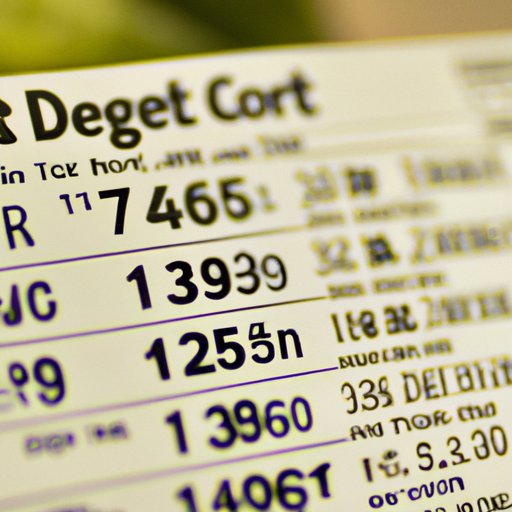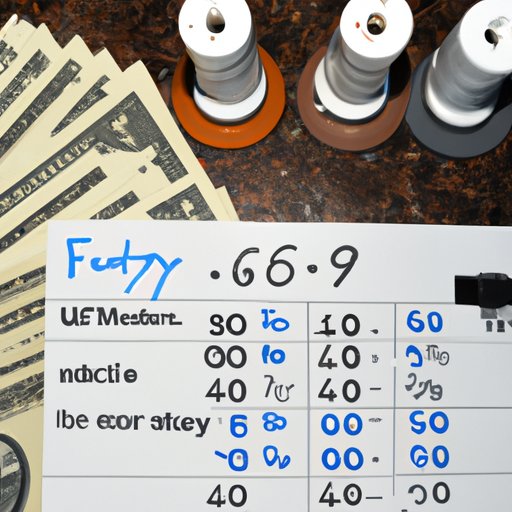Introduction
Colorado is known for its stunning landscapes, vibrant culture, and endless outdoor activities. As a result, many people are drawn to the state, leading to an ever-growing population. But how much does it cost to live in Colorado? In this article, we will explore the average cost of living in the state and break down the various expenses associated with housing, groceries, utilities, healthcare, and transportation.

Cost of Living Comparison: Colorado vs. Other States
The cost of living in Colorado is higher than the national average. According to the Missouri Economic Research and Information Center, the cost of living index in Colorado is 103.4, which is 3.4% above the national average of 100. This means that goods and services in the state tend to be more expensive than in other states. However, when compared to other Western states, Colorado’s cost of living is relatively low. For example, the cost of living index in California is 128.3, and the cost of living index in Washington is 113.5.
There are several factors that contribute to the cost of living in Colorado, including local taxes, wages, housing costs, and availability of goods and services. The state has a flat income tax rate of 4.63%, which is slightly higher than the national average of 4.6%. Additionally, the median household income in Colorado is $68,908, which is higher than the national median of $61,937.
The Average Cost of Renting a Home in Colorado
Rental prices in Colorado vary depending on location, type of housing, and size of the home. According to Zillow, the median monthly rent for a one-bedroom apartment in Colorado is $1,350. For a two-bedroom apartment, the median monthly rent is $1,595. The median monthly rent for a three-bedroom apartment is $1,895. These prices are slightly higher than the national median rents of $1,233, $1,459, and $1,744, respectively.
When renting a home in Colorado, there are additional costs to consider. These include security deposits, application fees, and pet deposits. Security deposits typically range from 1–2 months’ rent, while application fees typically range from $25–$50 per person. Pet deposits are usually equal to one month’s rent. Additionally, renters may have to pay for utilities such as electricity, water, and gas.

Understanding the Cost of Groceries in Colorado
Groceries are another significant expense for residents of Colorado. According to Numbeo, the average cost of groceries in the state is $300 per month for a family of four. Common grocery items such as milk, eggs, bread, and apples cost around $2.50, $2.20, $2.00, and $1.60, respectively. Prices may vary depending on the store and location.
It is possible to save money on groceries by taking advantage of sales, shopping at discount stores, and using coupons. Additionally, buying in bulk and growing your own food can help reduce grocery costs.

Breaking Down the Cost of Utilities in Colorado
Utilities are another essential expense for residents of Colorado. According to the U.S. Energy Information Administration, the average monthly utility bill in the state is $119. This includes electricity, natural gas, and water. Prices may vary depending on the type of provider and the amount of energy used.
Residents of Colorado can save money on their utility bills by reducing their energy usage. This can be done by switching to energy-efficient appliances, using LED light bulbs, and investing in insulation. Additionally, some utility providers offer discounts for customers who use renewable energy sources such as solar power.
Examining the Cost of Healthcare in Colorado
Healthcare is another important expense for residents of Colorado. According to HealthCare.gov, the average cost of health insurance in the state is $616 per month for an individual plan and $1,603 per month for a family plan. These prices are slightly higher than the national averages of $606 and $1,510, respectively.
In addition to health insurance premiums, residents of Colorado may have to pay for copays and deductibles. Additionally, there are several free and low-cost healthcare services available in the state. These include community health centers, county health departments, and Medicaid.
Evaluating the Cost of Transportation in Colorado
Transportation is another major expense for residents of Colorado. According to the American Automobile Association (AAA), the average cost of owning and maintaining a vehicle in the state is $8,556 per year. This includes fuel, insurance, maintenance, and registration costs.
Public transportation is also available in Colorado. The Regional Transportation District (RTD) offers bus and light rail services throughout the Denver metro area. Fares range from $2.60–$9.00 depending on the length of the trip. Additionally, Uber and Lyft are available in most cities in the state.
Conclusion
Living in Colorado can be expensive. However, there are ways to save money. By understanding the average cost of living in the state and taking advantage of discounts and deals, residents of Colorado can make their money go further.
To summarize, the cost of living in Colorado is higher than the national average. The average cost of renting a home in the state is $1,350 for a one-bedroom apartment, $1,595 for a two-bedroom apartment, and $1,895 for a three-bedroom apartment. The average cost of groceries is $300 per month, while the average utility bill is $119 per month. Health insurance in the state costs an average of $616 per month for an individual plan and $1,603 per month for a family plan. Finally, the average cost of owning and maintaining a vehicle in Colorado is $8,556 per year.
By taking advantage of discounts, deals, and public transportation, residents of Colorado can save money on their living expenses.
(Note: Is this article not meeting your expectations? Do you have knowledge or insights to share? Unlock new opportunities and expand your reach by joining our authors team. Click Registration to join us and share your expertise with our readers.)
